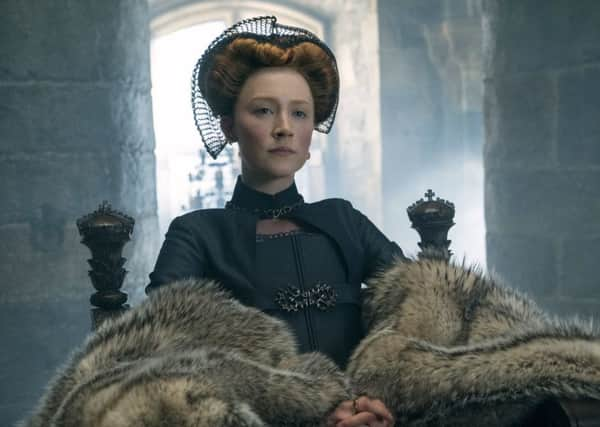Film reviews: Mary Queen of Scots | Beautiful Boy | Monsters and Men


Mary Queen of Scots (15) **
Beautiful Boy (15) ***
Monsters and Men (15) ***
Bookended by her beheading, the big new historical drama Mary Queen of Scots attempts to reclaim Mary Stuart (played by Saoirse Ronan) as a political pioneer undone by the machinations of inferior men. It’s a noble cause somewhat sabotaged by the film’s own middlebrow, half-hearted attempts to be edgy and a virtue-signalling script that doesn’t trust audiences to intuit the #MeToo parallels of the story for themselves. Making her directorial debut, theatre veteran Josie Rourke and screenwriter Beau Willimon, creator of the US version of House of Cards, have zeroed in on what they see as a thwarted natural alliance between Mary and Queen Elizabeth I (Margot Robbie). Unfortunately, their stylistically dated approach – rousing score, melodramatic performances, self-consciously fussy production design, cipher-like characters, meticulous make-up – dulls the over-stuffed tale of political intrigue that follows Mary’s return to Scotland and the distrust that her claim on the English throne inspires in both her own court and Elizabeth’s.
A cadre of treacherous men intent on isolating these formidable women and turning them against each other is present at every turn, something that, ironically, robs the film’s title character of some of the agency one might have expected her to have in a revisionist take like this. That may be the point, but the film’s two-sides-of-the-same-coin take on Mary and Elizabeth – presenting the former as symbol of youthful vivacity and fertility and the latter as pox-riddled, embittered and barren – trades in the sort of gender stereotypes a film like this should surely be trying harder subvert. “I’m more man than woman,” laments Elizabeth at one point, a clunky line that doesn’t so much summon the tragic toll of trying to lead a patriarchal society as call to mind Obi-Wan Kenobi’s assessment of Darth Vader in The Return of the Jedi. Ronan fares slightly better than Robbie; her plausible Scottish accent and flawless-sounding French (some of her dialogue is subtitled) striking a good creative balance that enables the film to acknowledge her complicated upbringing without confusing audiences not au fait with her story.
Advertisement
Hide AdStill, Ronan can’t quite transcend the pretzel-like turns the film takes to justify Mary’s every move as some kind of noble gesture for the long term good of the Scottish people, perhaps because the only Scottish people depicted in the film who aren’t of royal blood or in her immediate employ are shown to be an easily manipulated mob all too willing to believe the lies of a frothing-at-the-mouth bigot like John Knox (David Tennant). It doesn’t help that Ronan is afforded none of the subtle character moments Sofia Coppola provided Kirsten Dunst in her far more radical reinterpretation of another executed queen, Marie Antoinette; nor does the overwrought staging, which just looks antiquated next to the The Favourite, do Ronan, Robbie or the extensive cast of venerable supporting players any favours. Indeed, only Jack Lowden’s ribald turn as Lord Darnley, Mary’s sexually omnivorous husband, breaks free of the stuffiness. By contrast, Ronan and Robbie feel too constrained by the turgid approach, so much so that the clandestine meeting of monarchs the film builds towards proves anticlimactic, never really justifying the dramatic licence taken to include it. What a disappointment.
As a father and son reckoning with the ravages of addiction, Steve Carell and Timothée Chalamet do good work in Beautiful Boy, a bleak true-life tale based on parallel memoirs by US magazine journalist David Sheff (Carell) and his crystal meth-addicted son, Nic (Chalamet). Tracing David’s investigation into his son’s destructive habit, the film attempts to bypass some of the usual drug drama clichés by pinballing across the narrative timeline of their lives together in order to replicate structurally the frustrating cycle of recovery and relapse. It’s a nifty idea, negating the need to locate phoney cause-and-effect reasons for Nic’s addiction while also showing the blame, resentment, recriminations and heartache experienced by David and the rest of his family. But it also allows director Felix van Groeningen (The Broken Circle Breakdown) to draw parallels between the all-consuming nature of drug addiction and all-consuming anxiety of parenthood, with David frequently shown questioning his own culpability as he tries to reconcile his comfortable family life and progressive parenting style with the fact he now has an addict for a son who will rip off even his own pre-teen siblings to get money to score. If the film ultimately becomes a little enamoured with the relentless grind of this process, Carell and Chalamet are good enough to see it through.
Detailing the aftermath of a police shooting on a trio of witnesses (an African American cop, the friend of the victim who has footage of it on his phone, and a local high-school baseball prospect who just happened to be passing by), director Reinaldo Marcus Green’s feature debut Monsters and Men plays like a spiritual sequel to Ryan Coogler’s Fruitvale Station, exploring as it does the way an all-too-frequent act of brutality is absorbed into the everyday reality of those caught in the crossfire. Though the triptych structure makes the overall film feel a little uneven, the main characters’ respective introspection feels truthful, with BlacKkKlansman’s John David Washington especially good as a cop conflicted by his obligations to his department and his community. ■